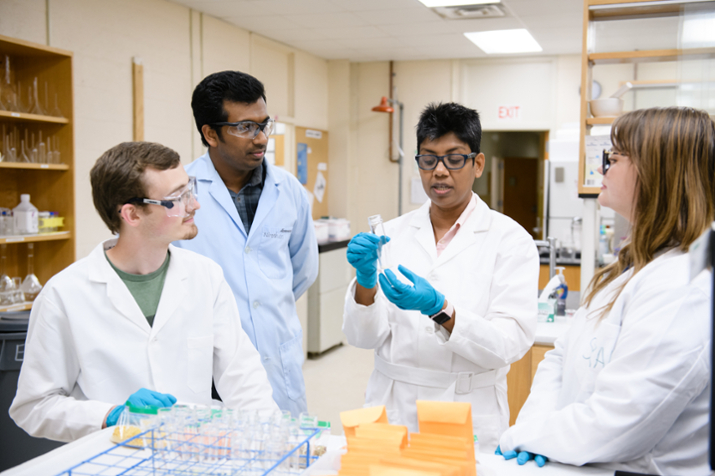- Academics
-
Undergraduate Majors
- Undergraduate Majors Overview
- Agribusiness
- Agricultural Education
- Agricultural Mechanization & Business
- Animal & Veterinary Sciences
- Environmental & Natural Resources
- Food Science & Human Nutrition
- Forest Resources Management
- Horticulture
- Packaging Science
- Plant and Environmental Sciences
- Turfgrass
- Wildlife & Fisheries Biology
-
Graduate Programs
- Graduate Programs Overview
- Request for Information
- Agricultural and Applied Economics (MS)
- Agricultural Education (MAgEd)
- Agriculture (MS, PhD)
- Animal & Veterinary Sciences (MS, PhD)
- Entomology (MS, PhD)
- Food, Nutrition and Culinary Sciences (MS)
- Food, Nutrition, and Packaging Sciences (PhD)
- Forest Resources (MFR, MS, PHD)
- Packaging Science (MS)
- Plant and Environmental Sciences (MS, PhD)
- Wildlife and Fisheries Biology (MWFR, MS, PhD)
- Scholarships
- Academic Departments
- Academic Advising
Plant and Environmental Sciences (MS, PhD)
The Plant and Environmental Sciences (PES) Program offers areas of study leading to two graduate degrees: Master of Science (MS) and Doctor of Philosophy (PhD). Students with baccalaureate degrees in agronomy, biology, chemistry, horticulture, physics, plant sciences, soil sciences, or related disciplines may pursue graduate studies in PES.
- The PhD and MS (thesis) are research degrees that require a dissertation and thesis, respectively.
- The MS (non-thesis) is a terminal degree that may be suited for students who will pursue a career in business, education, or other areas that do not require substantial research experience.
-
Specialization & Research Emphasis
Areas of specialization within PES are aligned with those of the major advisor (advisory committee chair). The most common areas of specialization include research topics in:
- Agronomy
- Crop Improvement/Plant Breeding
- Horticulture
- Crop Physiology/Plant Physiology
- Integrated Pest Management/Crop Protection
- Soil Science/ Soil Health
- Plant Pathology
- Sustainable Agriculture
- Microbial Ecology
- Turfgrass Science
- Weed Science
- Plant Nutrient Management
-
Admission Requirements
(in addition to Graduate School requirements)
A Bachelor of Science in a PES-related discipline is desirable, but not required.
GRE (Graduate Record Examination) scores are required for application. Prospective major advisors may petition to waive this requirement. A duly justified request to waive the GRE requirement should be addressed to the Graduate Program Coordinator. Waiver requests from the applicant will not be considered.
We rarely accept students straight from BS to PhD, and when we do, we accept them as MS en route to PhD. When a student goes straight to PhD, we (PES) require that the MS requirements for the first 30 credit hours are met.
-
Requirements for Degree
The PES Graduate Program follows Graduate School minimum degree requirements for credit hours (including research credits), time limits, and theses/dissertations.
With regard to MS degree credit requirements, the Graduate School requires a minimum of thirty hours beyond the bachelor’s degree for any master’s degree. At least one-half of the total graduate credit hours required by the advisory committee, exclusive of thesis research, must be selected from courses numbered 8000 or above.
With regard to PhD degree credit requirements, the Graduate School requires that a doctoral degree comprise a min-imum of 30 credits beyond the master’s degree, and at least 60 credits beyond the bachelor’s degree. A minimum of 12 credit hours of non-research coursework and a minimum of 18 hours of dissertation research are required for any doctoral degree.
Plan of study.
The Plan of Study is tailored to each student’s needs and interests. There are no core courses, but students are expected to be proficient in experimental design, statistical analysis, and the areas in plant sciences that are relevant to their research topics. Students may be required to correct deficiencies in their academic background by auditing or by enrolling in the supplemental courses.
Proposal Seminar.
Students are required to present a proposal seminar while enrolled in PES 8250 or PLPA 8070. This seminar should be pre-approved by the major advisor and advisory committee. We do allow non-enrolled students to present their seminar if they have taken either class in the past. We allow students to get one 8000-level credit for each of a maximum of two seminars.
Record-keeping.
Students must keep accurate records of experiments, data, and analyses. These records should be duplicated regularly and be available for inspection by the advisor or the advisory committee. Photographic records should be included as needed. The student must leave these records, including electronic files, with the advisor upon graduation or departure from the program.
Non-thesis report.
Non-thesis MS students are required to present an exit seminar and final report in accordance to the guidelines set by the advisory committee during the first committee meeting.
-
Financial Information
The PES department faculty members provide research assistantships (RA) within our degree programs if funding is available.
Many faculty members post opportunities for RAs on the PES Graduate Research Assistantship Openings web page.
There are a small number of College and University fellowships available to incoming students, that would provide a stipend. Some of those can be browsed at the Graduate School's Fellowship and Awards web page.
-
Job Placement
The PES Program forms graduates who can help producers and consumers face critical challenges in areas such as food security, stewardship of natural resources, climate change, and sustainable agriculture. Our graduates are employed by:
- Colleges and Universities (Research/Teaching/ Extension)
- Diagnostic Laboratories
- Agricultural Consulting Companies
- Biotechnology Companies
- Agrichemical Companies
- Public Policy Organizations
- Seed and Plant Production Companies
- Nurseries and Garden Centers
- International Agricultural Research Centers
- Biological Control Industries
- Botanical Gardens and Arboreta
- State Departments of Agriculture
- Landscape Design and Maintenance Firms
- USDA-Agricultural Research Service
- USDA-Animal and Plant Health Inspection Service
- Commercial Farms
- EPA- Environmental Protection Agency
- Family-owned Farms
-
Contact Information
Dr. Guido Schnabel
Graduate Program Coordinator
220 Biosystems Research Complex
Phone: 864-656-6705
schnabe@clemson.eduKim Phillips
Administrative Coordinator
171 Poole Agricultural Center
Phone: 864-656-4964
kimp@clemson.edu

